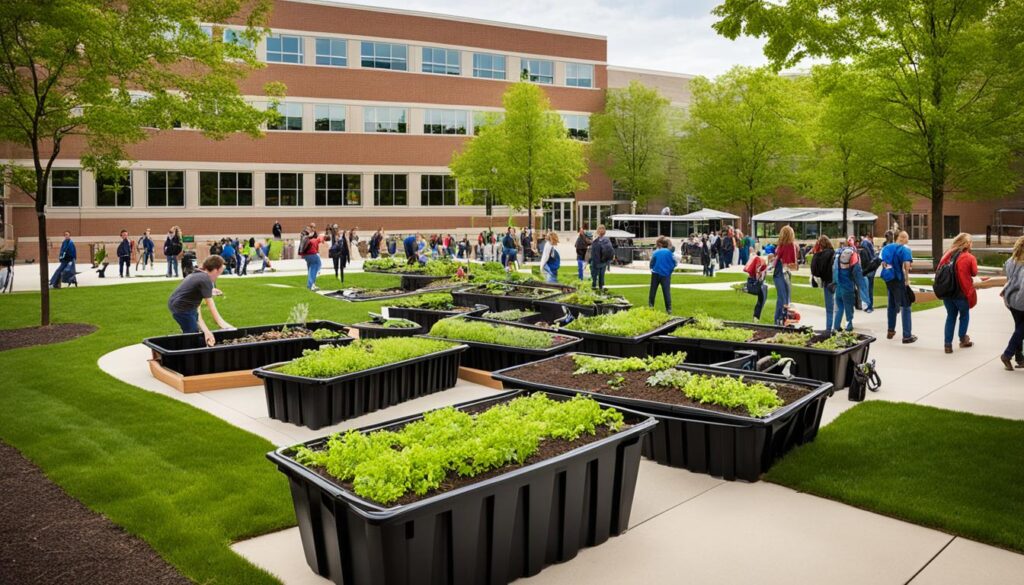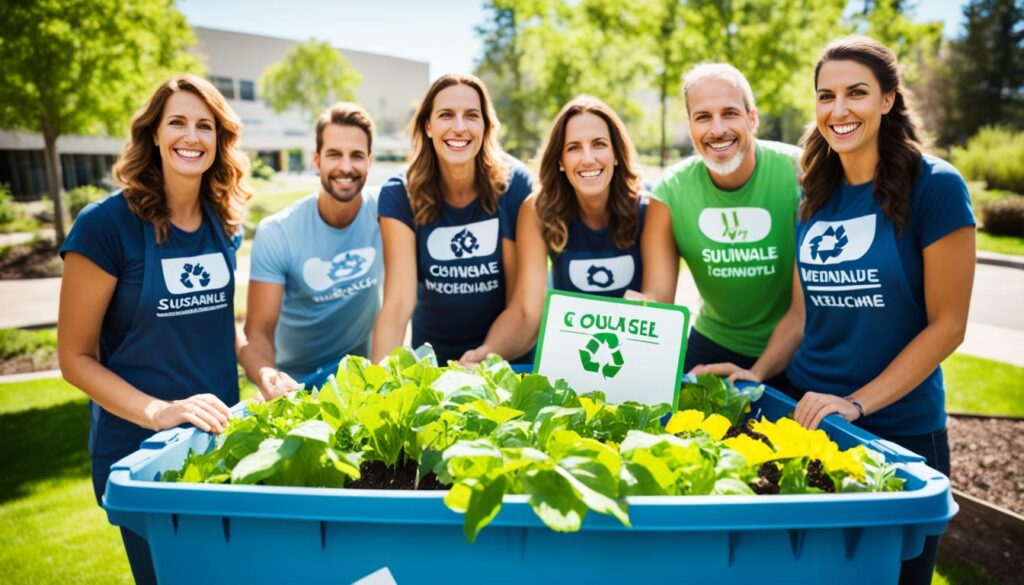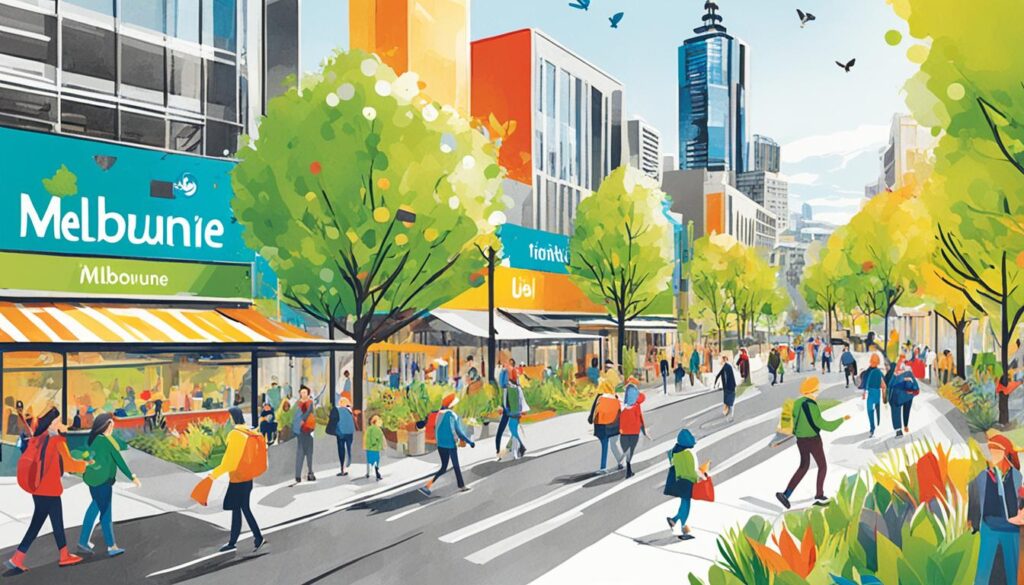Greetings from Melbourne! We are excited to share with you the educational initiatives that our city has implemented to promote sustainable living. With a strong focus on environmental sustainability and climate change, Melbourne has developed policies and programs to support schools in their efforts towards a greener future.
Our policy outlines requirements, advice, and supports for schools, aiming to reduce their environmental impact while providing resources and guidance for teaching environmental sustainability. It covers various priority areas, including school leadership, facilities and operations, teaching and learning, community partnerships, Koorie perspectives, and student-led action.
Key Takeaways:
- Melbourne has established educational initiatives to promote sustainable living.
- Schools in Melbourne are encouraged to follow the environmental sustainability policy.
- The policy covers priority areas such as school leadership, facilities and operations, teaching and learning, community partnerships, Koorie perspectives, and student-led action.
- A whole school approach is recommended for comprehensive implementation.
- School leaders play a crucial role in promoting environmental sustainability.
Environmental Sustainability Policy for Schools
The environmental sustainability policy for schools in Melbourne provides guidance and resources for schools to take action on climate change and reduce their environmental impact. It is a comprehensive policy that covers six priority areas:
- School Leadership
- Facilities and Operations
- Teaching and Learning
- Community Partnerships
- Koorie Perspectives
- Student-Led Action
The policy aims to empower schools to make a meaningful difference in environmental sustainability. By addressing these priority areas, schools can create a sustainable and eco-friendly learning environment for students.
The policy also includes mandatory requirements related to the Single-Use Plastics Ban and balloon releases. These measures are designed to reduce plastic waste and minimize environmental harm caused by balloon releases.
In addition to the mandatory requirements, schools are encouraged to develop an Environmental Sustainability Plan. This plan serves as a roadmap for schools to implement environmental sustainability actions and monitor their progress. By setting goals and timelines, schools can measure their achievements and continuously improve their sustainability efforts.
Implementing the environmental sustainability policy is a collective effort that involves various stakeholders, including school administrators, teachers, students, and the wider community. Through collaborative actions and a shared commitment to sustainability, schools in Melbourne can contribute to a greener and more environmentally conscious future.
Whole School Approach to Environmental Sustainability
In Melbourne, we strongly encourage schools to adopt a whole school approach to environmental sustainability. This holistic approach involves planning, implementing, and monitoring actions across the six priority areas outlined in the environmental sustainability policy. By taking a comprehensive approach, we can maximize the positive impact of our sustainability efforts and create a greener future for Melbourne.
Environmental Sustainability Policy Priority Areas
The environmental sustainability policy identifies six priority areas that schools should focus on:
- School leadership
- Facilities and operations
- Teaching and learning
- Community partnerships
- Koorie perspectives
- Student-led action
By addressing these areas, schools can ensure that sustainability is integrated into all aspects of their operations and educational programs.
Developing an Environmental Sustainability Plan
To implement a whole school approach, we encourage schools to develop an Environmental Sustainability Plan. This plan serves as a roadmap for achieving sustainability goals and can be customized to fit the unique context of each school.
Schools are encouraged to involve students, families, and community organizations in the planning process to foster a sense of shared responsibility and engagement. The plan should include clear goals and timelines for each priority area, providing a structured framework for sustainable actions.
Tracking Progress with ResourceSmart Schools
Monitoring progress is essential to ensure that sustainability efforts are effective and on track. Schools can utilize the ResourceSmart Schools program to track and measure their environmental sustainability initiatives. This program provides tools, resources, and support for schools in their sustainability journey.

| Benefits of a Whole School Approach |
|---|
| Enhanced coordination and collaboration among students, staff, and stakeholders |
| Improved engagement and ownership of sustainability initiatives |
| Increased efficiency and effectiveness of sustainability actions |
| Opportunities for cross-curricular integration of sustainability concepts |
| Positive environmental and social impacts within the school community and beyond |
A whole school approach to environmental sustainability ensures that sustainability becomes ingrained in the ethos and practices of every school. By working together and incorporating sustainable practices in every aspect of school life, we can create a brighter and more sustainable future for Melbourne.
School Leadership in Environmental Sustainability
School leaders play a crucial role in promoting environmental sustainability. In Melbourne, we encourage school leaders to take proactive steps towards creating a greener future. One effective approach is to establish an environmental sustainability committee or what we like to call a “Green group.” This committee should include representation from teachers, students, parents, and community members, ensuring that all stakeholders are involved in decision-making processes.
By forming this committee, school leaders can harness the collective wisdom and expertise of the school community, fostering a sense of shared responsibility for environmental sustainability. The committee can collaborate on initiatives, share ideas, and implement sustainable practices throughout the school.
Creating an Environmental Sustainability Plan is another essential step in engaging school leaders. This plan acts as a roadmap for integrating environmental sustainability into all aspects of school life, from curriculum to facilities management.
By involving different stakeholders in the development of the Environmental Sustainability Plan, school leaders can ensure that all perspectives are considered, fostering a sense of ownership and commitment among the school community.
Through effective school leadership, we can inspire and motivate students and staff to embrace sustainable practices and make meaningful contributions to environmental conservation.
Sustainable Facilities in Schools
Melbourne encourages schools to prioritize sustainable facilities as part of their environmental sustainability efforts. By designing and constructing buildings that meet Green Star Rating standards, schools can contribute to sustainable practices and reduce their environmental impact. The Green Star Rating represents best-practice protocols for sustainable design and construction, ensuring that schools meet high standards of energy efficiency, water conservation, and waste reduction.
To further enhance their sustainable facilities, schools in Melbourne are encouraged to incorporate renewable energy sources. Installing rooftop solar panels can help schools generate clean and renewable energy, reducing reliance on traditional energy sources and lowering greenhouse gas emissions. Additionally, schools can implement water conservation measures through rainwater harvesting and greywater systems, which can significantly reduce water consumption and promote responsible water usage.
Reducing waste is another important aspect of sustainable facilities in schools. Melbourne encourages schools to implement plastic-free initiatives, aiming to reduce the use of single-use plastics such as water bottles and food packaging. Schools can also divert green waste from landfills by implementing composting systems and encouraging the use of organic waste for mulching and fertilization.
Incorporating sustainable facilities in schools not only helps to create a greener and more eco-friendly environment but also provides valuable learning opportunities for students. By experiencing sustainable practices firsthand, students can develop a deeper understanding of the importance of environmental stewardship and sustainable living.
Teaching and Learning about Environmental Sustainability
Teaching environmental sustainability is a fundamental aspect of Melbourne’s educational initiatives. At all levels of schooling, we encourage teachers to incorporate sustainability concepts into their curriculum. By integrating sustainability into different subjects, students develop a deeper understanding of environmental issues and their role in creating a sustainable future.
The Victorian Curriculum and Assessment Authority provides examples of curriculum content related to sustainability. These resources assist teachers in designing lessons that promote environmental consciousness. Additionally, online tools are available for whole-school planning, allowing educational institutions to create comprehensive strategies for incorporating sustainability principles into the entire curriculum.
“By integrating sustainability into different subjects, students develop a deeper understanding of environmental issues and their role in creating a sustainable future.”
By integrating sustainability into subjects such as science, geography, and design and technology, students can explore real-world applications of sustainable practices. They learn about environmental challenges, such as climate change and biodiversity loss, as well as the importance of conserving natural resources and protecting ecosystems. Through hands-on activities, field trips, and projects, students gain practical experience and develop critical thinking skills that enable them to assess the environmental impact of their actions.
Promoting Sustainability Across the Curriculum
Integrating sustainability into various subjects cultivates a holistic understanding of environmental issues and their interconnectedness. Here are some examples:
- In science classes, students can learn about renewable energy sources, ecological systems, and the impacts of human activity on the environment.
- In geography classes, students can study the effects of urbanization, deforestation, and climate change on different regions.
- In design and technology classes, students can explore sustainable design principles and create eco-friendly solutions.
Community Partnerships for Environmental Sustainability
Melbourne recognizes the power of community partnerships in driving environmental sustainability initiatives. By collaborating with local organizations, businesses, and community groups, schools can foster a sense of shared responsibility and create a network of support for their sustainability efforts.
Engaging with community partners opens up valuable learning opportunities for students, enabling them to connect with real-world sustainability projects and learn from experts in the field. These partnerships provide practical experiences that bring environmental sustainability to life and complement the theoretical knowledge gained in the classroom.
“Community partnerships are vital to our mission of promoting environmental sustainability. By working together, we can make a greater impact on the environment and create a sustainable future for Melbourne.”
Through community collaborations, schools gain access to resources, expertise, and funding that can enhance their environmental sustainability initiatives. These partnerships can also facilitate the sharing of best practices and innovative ideas, creating a dynamic ecosystem for sustainable practices to thrive.
Furthermore, community partnerships serve as a platform for schools to engage with the broader community, raising awareness about environmental sustainability and encouraging individuals to take action. By involving local businesses, schools can showcase their commitment to sustainability while building mutually beneficial relationships.
Overall, community partnerships play a crucial role in promoting environmental sustainability in Melbourne. By harnessing the collective power of schools, organizations, and the community, we can create a greener and more sustainable future for all.

Benefits of Community Partnerships for Schools
Collaborating with community partners offers several benefits for schools:
- Access to resources, expertise, and funding
- Opportunities for experiential learning and real-world application
- Sharing of best practices and innovative ideas
- Enhanced community engagement and awareness
- Mutually beneficial relationships with local businesses
By leveraging these benefits, schools can amplify their environmental sustainability efforts and create lasting change within their communities.
| Community Partnerships | Benefits |
|---|---|
| Local organizations | Access to resources and expertise |
| Community groups | Opportunities for experiential learning |
| Businesses | Mutually beneficial relationships and funding opportunities |
Incorporating Koorie Perspectives in Environmental Sustainability Education
Melbourne recognizes the significance of incorporating Koorie perspectives in environmental sustainability education. Koorie perspectives encompass the invaluable knowledge, rich cultures, and sustainable practices of Aboriginal and Torres Strait Islander communities. By embracing and integrating Koorie perspectives, schools can foster cultural learning, encourage reflection, and cultivate deep respect for Indigenous knowledge and sustainable practices.
Incoporating Koorie perspectives into environmental sustainability education can be achieved through various strategies:
- Curriculum Content: Developing curriculum content that includes Koorie perspectives allows students to gain a holistic understanding of environmental sustainability through a diverse and inclusive lens. By studying the relationship between Aboriginal and Torres Strait Islander peoples and the land, students can gain a profound appreciation for their connection to the environment and the importance of preserving it for future generations.
- Engagement with Local Indigenous Communities: Building partnerships with local Indigenous communities provides an opportunity for students to learn directly from Indigenous elders, knowledge holders, and cultural practitioners. Engagements such as storytelling, cultural workshops, and field trips can deepen students’ understanding of sustainable practices embedded within Indigenous cultures.
- Integration of Indigenous Plants and Bush Foods: Incorporating Indigenous plants and bush foods in school gardens and landscapes not only enhances biodiversity but also promotes Indigenous knowledge and sustainable land management practices. These educational spaces become living classrooms that allow students to engage with the environment while embracing Koorie perspectives.
By integrating Koorie perspectives into environmental sustainability education, Melbourne aims to create a more inclusive, culturally aware, and environmentally conscious society.
“Incorporating Koorie perspectives into environmental sustainability education fosters a deep respect for Indigenous knowledge, cultivates cultural understanding, and enriches the learning experience.”
| Benefits of Incorporating Koorie Perspectives | Examples |
|---|---|
| Cultural Learning: Promotes understanding and respect for Aboriginal and Torres Strait Islander cultures, fostering cultural appreciation and harmonious coexistence. | Studying traditional land management practices and their relevance to sustainable agriculture. |
| Environmental Stewardship: Instills a sense of responsibility and connection with the land, inspiring students to protect and conserve natural resources. | Learning about the significance of sacred sites and the role of custodians in environmental conservation. |
| Community Engagement: Enhances relationships with local Indigenous communities, promoting mutual learning and collaboration. | Participating in cultural immersion programs and joint environmental projects. |
Conclusion
Melbourne’s educational initiatives for sustainable living provide schools with the resources and guidance needed to take action on environmental sustainability and climate change. By implementing a whole school approach and prioritizing school leadership, sustainable facilities, teaching and learning, community partnerships, Koorie perspectives, and student-led action, schools can create a greener future for Melbourne. These initiatives aim to instill eco-conscious living and promote a sustainable lifestyle among students, families, and the wider community. Through collaboration and engagement, Melbourne is working towards a more sustainable and environmentally conscious society.
FAQ
What is the environmental sustainability policy for schools in Melbourne?
The environmental sustainability policy for schools in Melbourne provides guidance and resources for schools to take action on climate change and reduce their environmental impact. It covers six priority areas: school leadership, facilities and operations, teaching and learning, community partnerships, Koorie perspectives, and student-led action.
What are the mandatory requirements related to the Single-Use Plastics Ban and balloon releases?
Schools in Melbourne are required to comply with the Single-Use Plastics Ban and are prohibited from releasing balloons as part of their environmental sustainability efforts.
How can schools adopt a whole school approach to environmental sustainability?
Schools in Melbourne are encouraged to develop an Environmental Sustainability Plan using the provided template and involve students, families, and community organizations in the planning process. The plan should include goals and timelines for each priority area and can be customized to fit the school’s context.
What is the role of school leaders in promoting environmental sustainability?
School leaders play a crucial role in promoting environmental sustainability. Melbourne suggests establishing an environmental sustainability committee or “Green group” with representation from teachers, students, parents, and community members. They can also create an Environmental Sustainability Plan using the provided template and involve different stakeholders in its development.
How can schools prioritize sustainable facilities?
Melbourne encourages schools to prioritize sustainable facilities as part of their environmental sustainability efforts. This includes designing and constructing buildings that meet Green Star Rating standards, incorporating renewable energy sources, implementing water conservation measures, and reducing waste through plastic-free initiatives.
How can environmental sustainability be incorporated into teaching and learning?
Teaching environmental sustainability is a key component of Melbourne’s educational initiatives. Teachers are encouraged to incorporate sustainability concepts into their curriculum across all levels of schooling. The Victorian Curriculum and Assessment Authority provides examples of curriculum content related to sustainability, and online tools are available for whole-school planning.
How can schools form community partnerships for environmental sustainability?
Melbourne emphasizes the importance of community partnerships in promoting environmental sustainability. Schools can collaborate with local organizations and businesses to provide valuable learning opportunities and support in implementing sustainability initiatives. This collaboration also offers opportunities for students to connect with real-world sustainability projects and learn from experts in the field.
How can Koorie perspectives be incorporated into environmental sustainability education?
Melbourne recognizes the significance of incorporating Koorie perspectives in environmental sustainability education. Schools can include Koorie perspectives by incorporating curriculum content, engaging with local Indigenous communities, and incorporating Indigenous plants and bush foods in school gardens and landscapes.
What are Melbourne’s educational initiatives for sustainable living?
Melbourne’s educational initiatives for sustainable living provide schools with the resources and guidance needed to take action on environmental sustainability and climate change. By implementing a whole school approach and prioritizing school leadership, sustainable facilities, teaching and learning, community partnerships, Koorie perspectives, and student-led action, schools can create a greener future for Melbourne.
